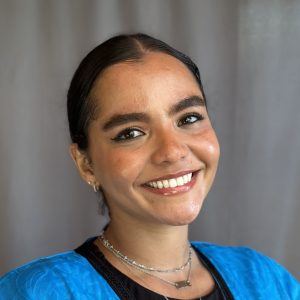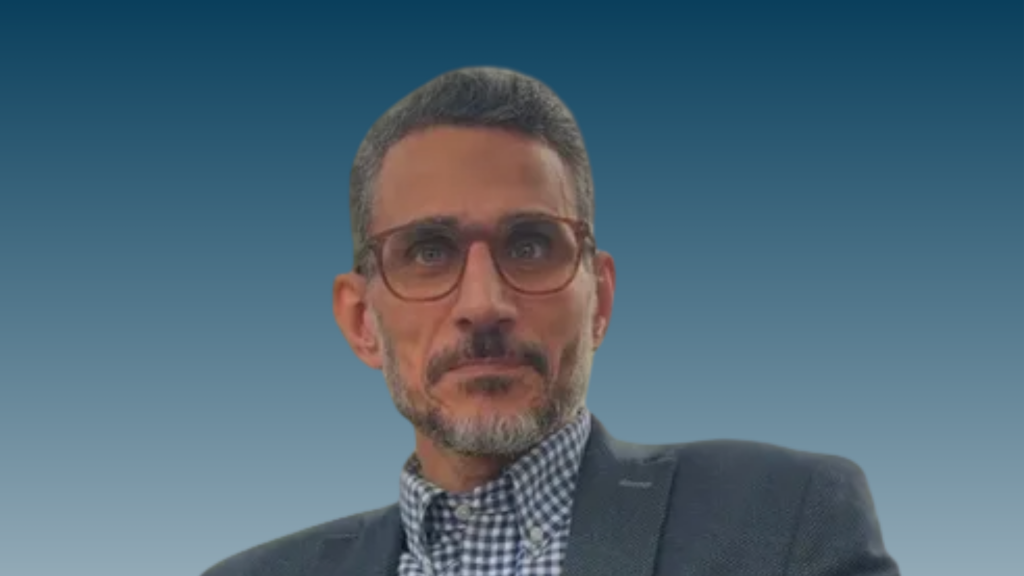Yasmina Benslimane is a Moroccan women’s rights defender and an Advisory Group member for the Democracy Matters Initiative at MEDC. As the founder of Politics4Her, she champions political participation and representation for young women in global majority countries, with a focus on climate justice, forced migration, gender-based violence, and peacebuilding.
While the intersection of gender, politics, and religion in the Middle East and North Africa (MENA) remains a critical area of tension, the empowerment of women is not just beneficial but essential for the progress of democratic governance and social justice in the region. MEDC’s Democracy Matters Initiative policy consultant Abdelrahman Ayyash recently sat down with Benslimane to discuss her work to increase women’s political participation, protecting women’s rights through legal reform in the MENA region, and how international actors have weaponized democracy and the impact on women’s rights movements in Morocco.
MEDC: Your work focuses on increasing young women’s political participation. How critical do you believe economic empowerment is for enabling women to engage more actively in the political processes of countries in the Middle East and North Africa (MENA), especially during conflict? What are some successful strategies you’ve observed in this area?
Yasmina Benslimane: Economic empowerment is not merely a benefit but a necessity for all women, particularly during times of conflict and war. Financial independence can liberate women from the patriarchal structures, enabling them to advocate for their rights and participate more actively in the public space. The success of any movement hinges on the ability of its constituents to sustain themselves economically during all times.
In conflict situations, like the current Israeli genocidal war on Gaza, the ability to mobilize resources is crucial not only for survival but also for advocacy and community engagement. We’ve initiated successful strategies like collaborating with feminist funders who understand the local needs and provide flexible support without demanding excessive, mostly unfeasible documentation that could harm the beneficiaries, which is essential during crises.
While mobilizing resources, feminist movements in the Middle East and North Africa (MENA), or the South West Asia and North Africa (SWANA) often encounter formidable obstacles. International funding platforms and conservative funders often impose stringent conditions that can be both dehumanizing and impractical. During emergencies, the need for swift action clashes with the slow and invasive processes demanded by some funders, highlighting a disconnect between the urgent needs on the ground and the procedural requirements imposed from afar.
Crowdfunding has also been instrumental. For example, in Palestine, we raised $71,000, directly impacting around 3,000 women. These funds – coming amid the prolonged Israeli blockade of humanitarian aid and the attack of humanitarian organizations’ staff and the ban of UNRWA – supported hygiene kit distributions and emergency grants, which is an indicator on how economic resources empower political action and facilitate rapid response to community needs.
Our experiences with platforms like GoFundMe, which initially froze funds intended for Palestinian families, demonstrate the additional scrutiny faced by movements in war zones. The bureaucratic hurdles not only delay the much-needed aid but also question the legitimacy of the aid recipients based on geopolitical biases rather than the humanitarian principles that should guide such support.
The MENA region presents a complex landscape for women’s rights, with a mix of progress and challenges. What legal reforms do you believe are essential for effectively protecting women’s rights, and how can international actors support these reforms without imposing external agendas or undermining local movements?
Critical legal reforms in the MENA region, or SWANA as I choose to call it, must address the outdated and often colonial-inherited laws. These reforms should be focused on national family codes that severely limit women’s rights in marriage, divorce, inheritance, and even the ability to confer nationality on their children. Many of these laws, steeped in colonial legacies and patriarchal structures, embed systemic discrimination against women and perpetuate inequality in the fabric of the modern legal system.
Advocating for the reform of laws to allow women equal standing in society is not an optional feat. International support should be strategic, respecting local contexts and enhancing the capacities of local movements without overstepping. This means supporting legal reforms that are crafted and championed by local activists, ensuring that these reforms are not perceived as imposed from the outside but are authentically derived from the people’s own needs and aspirations.
Effective support includes financial investment in grassroots organizations and public advocacy that respects local feminist voices. By fostering an environment of respect and support, rather than control, we can ensure that the reforms are sustainable and that they truly benefit the women they are meant to empower. An example of effective international support is when global organizations amplify local efforts that lead to significant legal changes, such as the abolition of laws that previously allowed rapists to avoid prosecution by marrying their victims in Morocco.
You’ve previously spoken about the weaponizing of democracy by international actors in the MENA region. How do you see this happening, and what impact does it have on local democratic movements and women’s rights movements in Morocco?
The weaponization of democracy occurs when international actors, under the guise of spreading democratic values, actually undermine them through invasive policies and double standards. This hypocrisy affects local movements by framing them as extensions of Western imperialism, which alienates them from their communities.
In Morocco, feminist movements struggle against both the legacy of colonialism and the contemporary challenges of being perceived as Western agents. To counteract this, it’s crucial to promote an understanding of feminism and women’s rights that do not provoke religious and societal norms and is rooted in local traditions and the historical contributions of SWANA women to these discourses. Prominent Islamic feminists, such as Fatima Mernissi and Asmae Lamrabet, have argued that women’s rights are indeed part of Islamic teachings; it is the interpretation that has been co-opted by a male-dominated elite to perpetuate patriarchy.
We need to assert that reforms like the Mudawana (family code) are rooted in local needs rather than external pressures. We need to emphasize that advocating for women’s rights is not a Western imposition but a continuation of our own rich history of social justice.
How do international perceptions of feminism influence or affect local feminist movements in MENA countries? Are there ways in which these external narratives either strengthen or hinder the progress of women’s rights in the region?
International perceptions of feminism can significantly impact local feminist movements in the region. Often, feminism is viewed as a Western concept that promotes values seen as contrary to our cultural and religious beliefs, which can hinder our progress. The narrative of “white feminism” can alienate local movements and overshadow the diverse voices and experiences that shape our struggles.
External narratives need to support rather than lead the feminist discourse in SWANA, promoting a nuanced understanding of feminism that includes economic empowerment, legal rights, and cultural integrity. By aligning with local activists and respecting their leadership, international feminists and funders can help foster a more inclusive, effective movement that resonates within SWANA societies, avoiding the pitfalls of imposing a one-size-fits-all feminism that fails to address specific local needs.
The path forward must also involve an active part on our end; a critical re-evaluation and decolonization of feminist narratives in the region. We must endeavor to reconnect with and promote indigenous feminist traditions that acknowledge and integrate the region’s rich history of female leadership and scholarship.
The Expert
Yasmina Benslimane is an Advisory Group member for MEDC’s Democracy Matters Initiative. She is an award-winning Moroccan feminist activist, consultant, and women’s empowerment coach with deep roots in North Africa and the Middle East. As the founder of Politics4Her, she champions political participation and representation for young women in Global Majority countries, with a focus on climate justice, forced migration, gender-based violence, and peacebuilding.
Benslimane also co-founded SWANA Climate Sirens, advocating for indigenous and decolonial youth-led feminism in the climate movement. Her extensive recognition includes being featured on international platforms like HuffPost, Al Jazeera, and BBC, and speaking at institutions such as the United Nations. Benslimane has earned numerous accolades, including being named one of BBC’s 100 Most Influential and Inspiring Women of 2023, Forbes 30 Under 30, MADRE Champion, and Top 100 Under 40 Most Influential People of African Descent in 2024.
The Author
Abdelrahman Ayyash is a policy consultant for the Democracy Matters Initiative at MEDC.



|
President Trump is Undermining Foreign Aid Transparency and Accountability